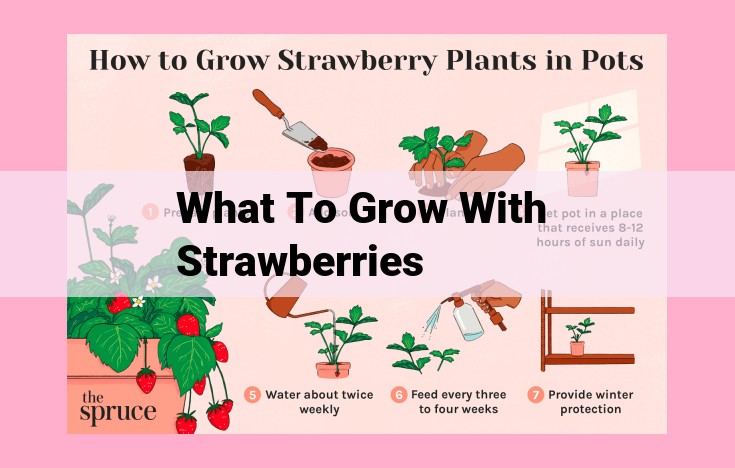Optimize Strawberry Growth And Pest Control: Companion Planting And Mulching Strategies

Companion planting with arugula, basil, and garlic enhances strawberry growth by attracting beneficial insects like ladybugs and lacewings for pest control. Mulching with straw or wood chips helps retain moisture, suppress weeds, and improve soil health.
Discover the Wonders of Companion Planting for a Thriving Garden
In the realm of gardening, companion planting emerges as a game-changer, offering a wealth of benefits that can transform your garden into a bustling, harmonious ecosystem. By strategically pairing certain plants, you can unlock extraordinary improvements in their growth, productivity, and resistance to pests.
The Synergistic Power of Companion Plants
The practice of companion planting involves placing different plant species in close proximity to derive mutual advantages. This symbiotic relationship occurs when plants release beneficial substances into the soil or atmosphere that support and enhance the growth of their companions. For example, planting garlic alongside roses repels aphids, while nasturtiums act as a sacrificial plant, attracting pests away from more valuable crops.
Introducing the Companions
Arugula: This leafy green releases glucosinolates, compounds that deter insects and enhance the growth of tomatoes and carrots.
Basil: A culinary herb, basil emits a pungent scent that repels flies, mosquitoes, and aphids. It also improves the flavor of tomatoes and peppers.
Garlic: Garlic’s pungent aroma and sulfur compounds act as a natural pest repellent, particularly effective against aphids, thrips, and spider mites.
By understanding the specific benefits of these and other companion plants, you can create a thriving garden that supports a healthy and balanced ecosystem.
Beneficial Insects: Nature’s Pest Control Allies
In the realm of organic gardening, embracing nature’s defenders is paramount for pest control. Beneficial insects, our tireless allies, play a pivotal role in maintaining a healthy and thriving garden. Let’s explore their remarkable contributions and discover the myriad ways they safeguard our plant havens.
Ladybugs: The Voracious Aphid Hunters
These vibrant beetles are nature’s formidable aphid assassins. Ladybugs, both adults and larvae, relish these soft-bodied pests, consuming hundreds throughout their lifetime. By reducing aphid populations, ladybugs protect plants from the harm caused by these sap-sucking insects.
Lacewings: The Delicate Eggs Killers
These graceful insects are masters of egg predation. Lacewings lay their eggs on stalks, allowing larvae to reach out and devour the eggs of pests such as aphids, whiteflies, and codling moths. Their voracious appetite has earned them the title of “aphid lions.”
Parasitic Wasps: The Stealthy Assassins
These tiny but mighty insects are nature’s secret weapon against pests. Parasitic wasps lay their eggs inside or on the bodies of host insects, where larvae hatch and feed on the hapless victims. By targeting pests at their vulnerable stages, parasitic wasps effectively control populations.
Benefits Beyond Pest Control
Apart from their predatory prowess, beneficial insects provide additional benefits to the garden ecosystem. They:
- Pollinate flowers, aiding plant reproduction.
- Extract nectar and pollen, supporting a vibrant food web.
- Contribute to soil health by breaking down organic matter.
Encouraging Beneficial Insects
Attracting and supporting beneficial insects is crucial for a balanced garden. Here are a few simple steps:
- Avoid pesticides: Chemical pesticides kill beneficial insects along with pests. Opt for organic methods instead.
- Provide habitat: Plant a variety of flowers, especially those that bloom at different times, to attract insects throughout the season.
- Minimize disturbance: Beneficial insects prefer undisturbed areas. Limit unnecessary digging or tilling.
- Introduce beneficial insects: Consider introducing ladybugs or parasitic wasps to boost their populations.
By embracing the power of beneficial insects, gardeners can cultivate a thriving and resilient garden, free from the harmful effects of synthetic pesticides. These natural pest control allies are indispensable players in maintaining the delicate balance of nature’s tapestry.
Mulching: A Gardener’s Versatile Ally
In the tapestry of gardening, mulching plays a pivotal role, offering a myriad of benefits that elevate your plants’ well-being while easing your workload. Like a protective blanket, mulch shields your garden from the vagaries of nature, suppressing weeds, conserving moisture, and enriching the soil.
Exploring the Mulching Spectrum
Mulching materials come in an array of forms, each with unique advantages and drawbacks:
-
Black Plastic: A formidable weed barrier, black plastic also retains heat, accelerating plant growth. However, it can hinder soil aeration and water penetration.
-
Straw: A cost-effective and biodegradable option, straw excels at insulating plants and retaining moisture. Its lightweight nature makes it ideal for windy areas.
-
Wood Chips: Derived from tree bark, wood chips are durable and aesthetically pleasing. They suppress weeds, improve soil structure, and attract beneficial insects.
Mulching Tips for a Thriving Garden
To harness the full potential of mulching, follow these practical tips:
-
Apply mulch under plants, avoiding direct contact with stems to prevent rot.
-
Maintain a layer of 2-3 inches, ensuring adequate weed suppression and moisture retention.
-
Choose the right mulch for your specific needs. Consider the plant’s water requirements, soil conditions, and aesthetic preferences.
-
Refresh mulch periodically, replenishing nutrients and maintaining its effectiveness.
By embracing mulching as a cornerstone of your gardening practice, you empower your plants to flourish, reduce your workload, and create a healthy and vibrant garden oasis.